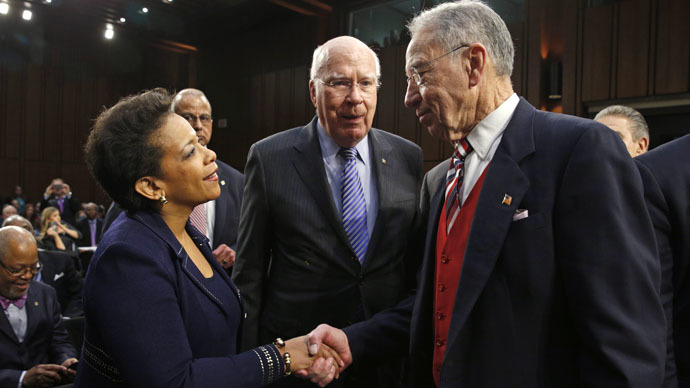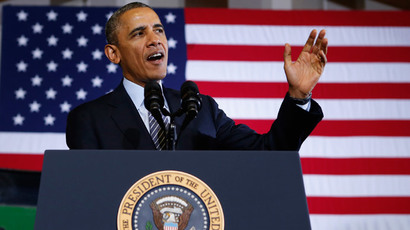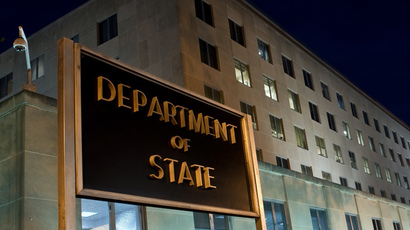GOP stall tactics hold up Obama's AG pick & 150 other nominees

Loretta Lynch, President Barack Obama’s pick to be the next attorney general, has had her confirmation held up for almost six months. While she may be confirmed in the coming days, nearly 150 other nominees wait in limbo for the US Senate to act.
If Lynch is confirmed, she would become the first African-American woman to lead the Department of Justice. But she has been waiting since her November nomination to be fully confirmed, despite the fact that she is not considered to be a controversial choice ‒ especially compared with the current attorney general, Eric Holder, who is roundly disliked by the GOP.
Republicans ‒ the majority party in the Senate ‒ have delayed a confirmation vote until Senate Democrats end a filibuster against an unrelated bill designed to protect victims of human trafficking.
Now civil rights groups are calling Republicans hypocritical for not allowing for a confirmation vote on the Senate floor.
READ MORE: President Obama picks first black woman to head Justice Department
"There is an injustice allowing Loretta Lynch to hang in the balance and in blocking this nomination. We ask you to schedule a vote and allow Loretta Lynch to be confirmed," liberal and civil rights groups wrote in a letter to Senate Majority Leader Mitch McConnell of Kentucky dated Friday and released Monday. "Justice delayed is justice denied and by not moving swiftly to a vote, you are standing in the way of progress."
"With a stellar record, bipartisan support and the historic nature of her nomination, many people believed that this confirmation would have few hurdles to cross," the letter continued. "However, stymied by partisanship over an unrelated bill, she has yet to receive a vote on her nomination by the full Senate and the rights of the American people are left in the balance."
On Wednesday morning, a group of black women ‒ including lawyers and clergy ‒ confronted one of McConnell’s top aides, and demanded a vote on Lynch’s nomination, according to CNN. It was the second time in recent months the group had called on McConnell to schedule a vote on the candidate.
"As soon as we're done with the anti-slavery bill," Don Stewart, deputy chief of staff and communications director for McConnell, told the women.
Republicans expect that bill to be passed by Wednesday.
“My sense is, over the next 48 to 72 hours, that is going to be resolved,” Sen. Bob Corker (R-Tennessee), chair of the Senate Foreign Relations Committee, said on CNN’s State of the Union on Sunday.
At 167 days, Lynch is the Cabinet-level nominee who has waited the longest to be confirmed over the last three presidencies, the Washington Post reported. The previous record-holder was Togo West in 1998, whom President Bill Clinton had chosen for Veterans Affairs secretary. He waited 147 days to be confirmed.
READ MORE: Rand Paul: Audit the Fed or I will hold up nominees
President George W. Bush’s longest waiting nominee was Alphonso Jackson for secretary of Housing and Urban Development, who waited 110 days. Before Lynch, Obama’s most patient nominee was John Bryson, who waited 142 days to be confirmed as Commerce secretary.
Lynch would become only the third of Obama’s nominees to be approved by the 114th Senate, which began in January. The first, now-Defense Secretary Ashton Carter, was confirmed after 69 days, with a 93-5 vote. The second, Alfred Bennett, was confirmed in a 95-0 vote last Monday. Bennett will join the US District Court for the Southern District of Texas, a seat that had been vacant for 769 days.
That District Court has such a heavy caseload that it’s considered a “judicial emergency,” and it has two other vacancies that have been open for 840 days and 1419 days respectively, according to US Courts. There are 23 total judicial emergencies in federal courts. In Texas there are 11 federal judicial vacancies, the most of any state, the Houston Chronicle reported.
Many of Obama’s nominees ‒ not just in the judicial system or at the Cabinet level ‒ are being held up by Senate Republicans using a process called “slow-walking,” meaning that senators have created delays on hearings and votes in committees, and that ‒ once they have been approved by their respective committees ‒ McConnell has refused to bring the nominees up for a floor vote.
READ MORE: Obama tells GOP: 'Don't hold attorney general nominees hostage'
Slow-walking is seen as a revenge tactic for a November 2013 decision by Sen. Harry Reid (D-Nevada), who was then the Senate majority leader, to use the “nuclear option” ‒ changing the number of votes needed to end a filibuster from 60 to a simple majority ‒ to push through 96 judges and 302 executive nominees, according to the Congressional Research Service (CRS).
There are currently 18 nominations that the entire Senate needs to vote on, while more than 130 have yet to be voted out of committee, Politico reported.
“It’s appalling,” Sen. Chuck Schumer of New York, the third-highest Senate Democrat, said. “I mean, how many times are they just going to throw logs on the process of government? I mean, even district court judges, for lord’s sake.”
Judicial nominees are typically recommended by their home-state senators, with paperwork submitted by the president and a ranking process by the American Bar Association before the Senate Judiciary Committee holds a hearing where its members interview the nominee. After that, the committee votes on the president’s choice. If the nominee is approved, the full Senate must vote on the candidate.
“It’s totally different than what we had for President Bush, that’s for sure,” said Sen. Debbie Stabenow (D-Michigan), according to Politico. “There hasn’t been the same respect for the fact that when a president wins an election, they have the right to have their team.”
When Democrats controlled the Senate in 2007 at the start of President George W. Bush’s last two years in office, the chamber confirmed 15 judicial nominees in the first quarter of the year, according to CRS.














